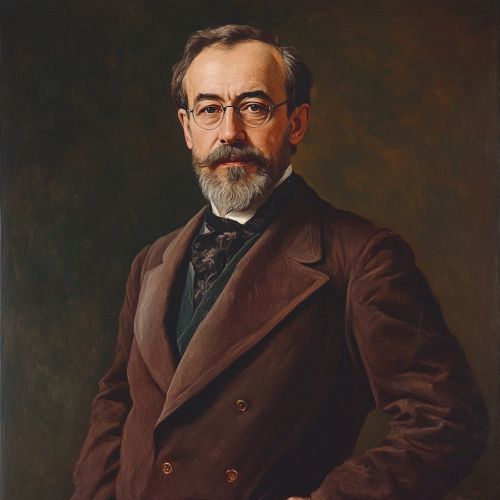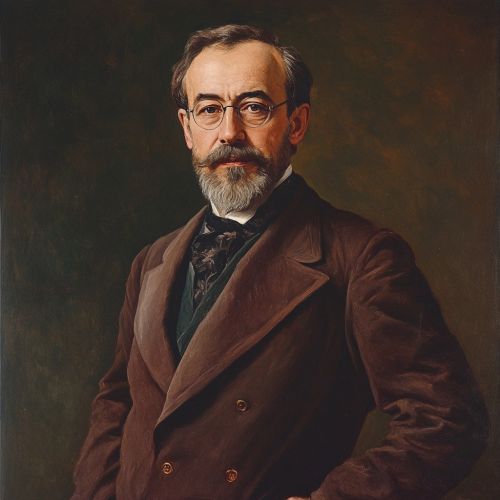Alexander Bogdanov
Early Life and Education
Alexander Bogdanov, born Alexander Alexandrovich Malinovsky on August 22, 1873, in Sokolka, Grodno Governorate, Russian Empire (now Sokółka, Poland), was a Russian physician, philosopher, economist, science fiction writer, and revolutionary. He was the second of six children in a family of a schoolteacher. Bogdanov's early education was marked by his enrollment in the Tula Gymnasium, where he exhibited a keen interest in the sciences and humanities.
In 1892, Bogdanov entered the Moscow University to study natural sciences but was soon expelled due to his involvement in revolutionary activities. He continued his education at the University of Kharkov, where he earned a medical degree in 1899. His academic pursuits were closely intertwined with his political activities, as he became deeply involved in the Russian Social Democratic Labour Party (RSDLP).
Political Involvement
Bogdanov's political career began in earnest in the late 1890s when he joined the RSDLP. He quickly aligned himself with the Bolshevik faction led by Vladimir Lenin. Bogdanov's contributions to the Bolshevik cause were multifaceted, encompassing both theoretical and practical dimensions. He was instrumental in the establishment of the Bolshevik underground press and played a key role in organizing revolutionary activities.
However, Bogdanov's relationship with Lenin became strained over time due to ideological differences. Bogdanov advocated for a more decentralized and democratic form of socialism, which contrasted with Lenin's vision of a highly centralized party structure. This ideological rift culminated in Bogdanov's expulsion from the Bolshevik faction in 1909.
Philosophical Contributions
Bogdanov's philosophical work is characterized by his development of Empiriomonism, a synthesis of empiricism and monism. Empiriomonism posits that all knowledge is derived from sensory experience and that the mind and the world are not separate entities but are part of a unified whole. This philosophy was influenced by the works of Ernst Mach and Richard Avenarius.
In his seminal work, "Empiriomonism" (1904-1906), Bogdanov argued that scientific knowledge should be based on the collective experience of society rather than individual perception. He believed that this approach would lead to a more objective and comprehensive understanding of reality. Bogdanov's philosophical ideas were met with both acclaim and criticism within the Marxist community, with some viewing them as a valuable contribution to Marxist theory, while others saw them as a deviation from orthodox Marxism.
Scientific and Medical Work
Bogdanov's scientific endeavors were diverse, encompassing fields such as medicine, biology, and systems theory. As a physician, Bogdanov made significant contributions to the field of hematology. He conducted pioneering research on blood transfusion, believing that it could be a means to rejuvenate the human body and extend life. In 1924, he founded the Institute for Hematology and Blood Transfusion in Moscow, where he conducted numerous experiments on blood transfusion.
Bogdanov's interest in blood transfusion was not merely scientific but also ideological. He saw it as a means to promote social solidarity and collective well-being. His experiments, however, were not without risks, and in 1928, Bogdanov died following a blood transfusion experiment that went wrong.
Literary Contributions
In addition to his scientific and philosophical work, Bogdanov was a prolific writer of science fiction. His most famous work, "Red Star" (1908), is a utopian novel set on Mars, where a socialist society has been established. The novel explores themes of social organization, technological advancement, and the potential for human progress. "Red Star" was followed by a sequel, "Engineer Menni" (1913), which delves deeper into the development of Martian society and its technological achievements.
Bogdanov's science fiction works were not merely literary exercises but were also vehicles for his philosophical and political ideas. They provided a platform for him to explore the possibilities of a socialist future and to critique contemporary social and political conditions.
Influence on Systems Theory
Bogdanov is also recognized as a pioneer in the field of systems theory. His work "Tektology: The Universal Organization Science" (1913-1922) is considered one of the earliest contributions to this field. In "Tektology," Bogdanov proposed that all complex systems, whether biological, social, or technological, could be understood through a common set of principles. He argued that these principles could be used to analyze and optimize the organization of any system.
Bogdanov's ideas on systems theory were ahead of their time and anticipated many of the concepts that would later be developed by Ludwig von Bertalanffy and other systems theorists. Although his work was not widely recognized during his lifetime, it has since gained recognition as a foundational contribution to the field.
Legacy
Alexander Bogdanov's legacy is multifaceted, encompassing his contributions to philosophy, science, literature, and political theory. Despite his ideological differences with Lenin and his eventual marginalization within the Bolshevik movement, Bogdanov's ideas have continued to influence various fields of study. His work on blood transfusion laid the groundwork for future medical advancements, while his philosophical and literary contributions have inspired subsequent generations of thinkers and writers.
Bogdanov's interdisciplinary approach and his commitment to the integration of scientific and philosophical knowledge remain relevant today. His vision of a society based on collective well-being and scientific progress continues to resonate with contemporary discussions on social and technological development.


